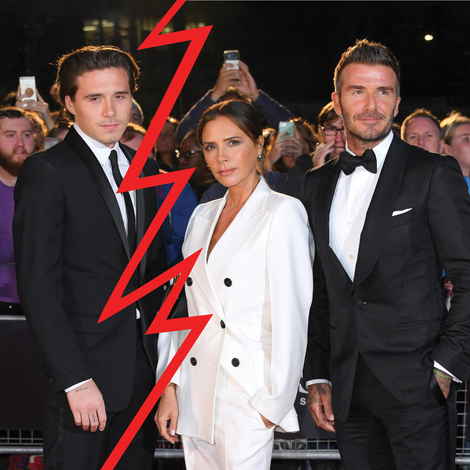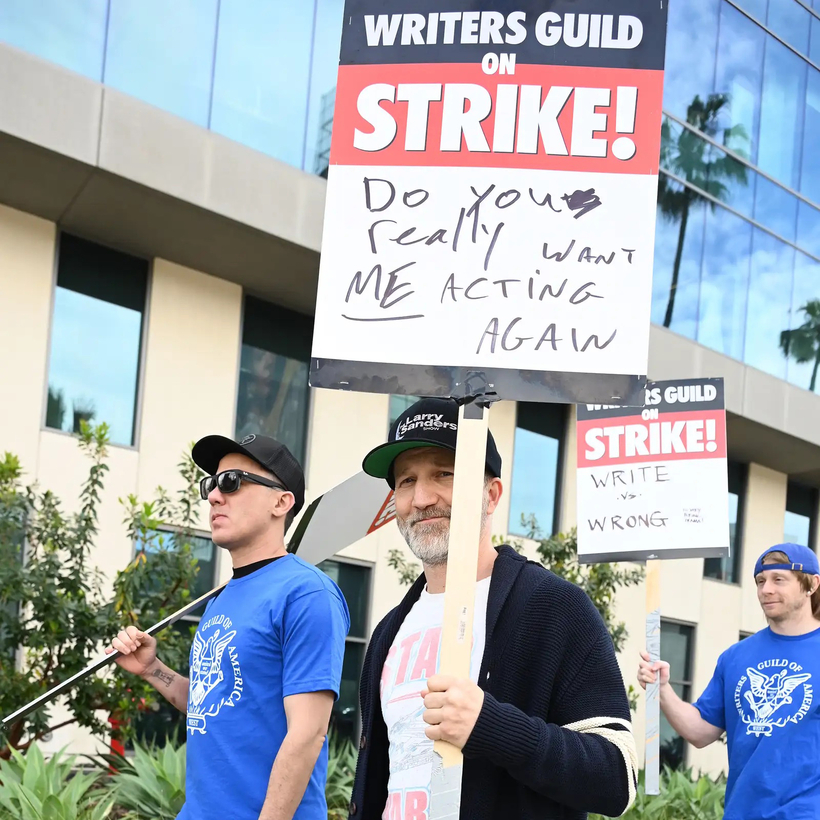I’m on strike. Most of my friends are on strike, too. Each weekday morning, we text about which of the struck companies we should go picket, choosing from the available options like we’re pairing a wine with our entrée. It’s hot today, and we’d like a quieter walk in the shade but don’t want to drive too far—let’s go with Disney.
Each of the picket locations has a sort of micro-culture reflective of which writers can afford to live nearby. Fox and Amazon, on the west side of Los Angeles, are breezy and relaxed, populated by sun-kissed boomers wearing straw hats and a quarter-zip from Crossroads School. They built their careers in the halcyon days of syndication and beefy residuals.
Warner Bros. and Universal, in Burbank and Studio City, are louder and scrappier, full of millennials who live in the Valley. Streaming shows got many of them into the Writers Guild of America, but when those shows were abruptly canceled, they struggled to find work. And when they got their residual checks, they were worth about as much as the stamps on the envelopes in which they arrived.

I usually go to Netflix, a cluster of high-rises abutting the 101 freeway in Hollywood. Most of the writers who picket there live in Los Feliz or Silver Lake, and it feels like everyone either knows each other already or, within a few seconds, can figure out some connection. The Netflix building, on the other hand, feels decidedly impersonal, a fortress of concrete and heavily tinted glass. Through one of the ground-floor windows you can make out the silhouette of Young-hee, the giant doll that presided over a mass execution in Squid Game. We shuffle back and forth behind her, all along the watchtower.
We know that picketing is not the primary function of the strike. While its ancillary benefits are significant—forging a tighter community, keeping morale high, garnering public support—picketing is really a means of enforcing our true leverage: not working. Not working is what grinds the wheels of our industry to a halt, inflicting economic pain on studios until they’re forced to make concessions they don’t want to make.
Each weekday morning, we text about which of the struck companies we should go picket, choosing from the available options like we’re pairing a wine with our entrée.
The use of the term “strike” in this context dates back to 1768, when a group of British sailors “struck” the sails from the top of their boss’s ship, rendering it inoperable. Re-attaching the sails was dangerous, and the owners of the ship weren’t about to climb up there and fix them themselves. Those sailors’ flat refusal to work until they received a better deal created the term, and the practice, of striking.
I would love to go back in time and explain to those scalawags that their act of defiance would one day lead to our current impasse: screenwriters refusing to work until our employers promised, among other things, not to replace us with artificial-intelligence software. I imagine they’d have a lot of questions.
Most strikes do not enjoy the overwhelming public support that ours does. Joe Biden supports us. Flavor Flav supports us. Most days, there is a food truck near our picket line passing out pizza or doughnuts courtesy of celebrities such as Lil Wayne, Pete Davidson, and an alliance of late-night show hosts (including Stephen Colbert, Jimmy Fallon, Jimmy Kimmel, Seth Meyers, and John Oliver). The band Imagine Dragons played an acoustic set outside Netflix around two p.m. on a weekday. Our cause is just, our coalition is fearsome, and our anthem is “Radioactive.”

There are occasional reminders that some people don’t support us. Near Disney, a doctor leaving his shift at a nearby hospital rolled his eyes at a friend’s sign that read, I’d rather be home playing Zelda. At Amazon, someone in a passing car yelled, “Go back to work.” At Universal, some guy allegedly tried to hit picketers with his car and then gave them the middle finger as he sped away. That guy must really miss watching late-night talk shows.
It’s hot today, and we’d like a quieter walk in the shade but don’t want to drive too far—let’s go with Disney.
The most frequent topic of conversation on the picket line, by a wide margin, is when the strike will end. Some people are sure it will be over soon, accelerated by a potential Screen Actors Guild strike. Others speculate that it’ll last all summer. The most pessimistic toss around bone-chilling words like “Christmas” and “January.”
The truth is that we don’t know, so we’re adjusting to uncertainty. We’re canceling vacations. We’re pausing gym memberships. We’re working part-time as babysitters, barbacks, and Uber drivers. It’s tough, but the juice is worth the squeeze; the entertainment industry is changing rapidly, and striking now is the only means of ensuring that we’re positioned and protected for whatever the future may hold.

In the meantime, I’ll continue to show up every day for my fellow writers, and for myself. Because, while we all miss working, the solidarity on display has been truly heart-swelling. Screenwriting can be a lonely, embittering career. At times, it can feel like a zero-sum game in which someone getting a job or selling a script means that you lost and they won. All of us, at one point or another, have had a pit in our stomach while reading about a colleague’s success in the trades.
But out here on the picket line, that’s all fallen away: me, my friends, my neighbor whose name I can’t remember, Dermot Mulroney, a camp counselor I haven’t seen since I was a teenager, that one guy from Jury Duty, and thousands of others are all in it together, and we’re going to win.
Dan Brier is a Los Angeles–based writer

